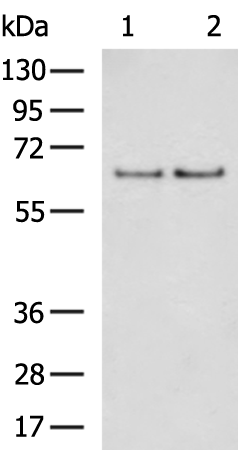
| WB | 咨询技术 | Human,Mouse,Rat |
| IF | 咨询技术 | Human,Mouse,Rat |
| IHC | 咨询技术 | Human,Mouse,Rat |
| ICC | 技术咨询 | Human,Mouse,Rat |
| FCM | 咨询技术 | Human,Mouse,Rat |
| Elisa | 1/5000-1/10000 | Human,Mouse,Rat |
| Aliases | CD50; CDW50; ICAM-R |
| WB Predicted band size | 60 kDa |
| Host/Isotype | Rabbit IgG |
| Antibody Type | Primary antibody |
| Storage | Store at 4°C short term. Aliquot and store at -20°C long term. Avoid freeze/thaw cycles. |
| Species Reactivity | Human, Mouse |
| Immunogen | Synthetic peptide of human ICAM3 |
| Formulation | Purified antibody in PBS with 0.05% sodium azide and 50% glycerol. |
+ +
以下是关于ICAM3抗体的3篇文献摘要信息,供参考:
1. **"ICAM-3 regulates lymphocyte morphology and integrin-mediated T cell interaction with endothelial cell monolayers"**
*作者:van der Merwe, P.A. et al. (1996)*
摘要:研究通过ICAM3特异性抗体阻断实验,揭示了ICAM3在T细胞形态变化及整合素介导的T细胞与内皮细胞黏附中的关键作用,证实其参与免疫细胞迁移调控。
2. **"Structural and functional characterization of anti-ICAM-3 monoclonal antibodies"**
*作者:Hernández-Caselles, T. et al. (1996)*
摘要:报道了多个抗ICAM3单克隆抗体的开发,通过表位定位和功能分析,发现不同抗体可特异性干扰ICAM3与配体LFA-1的结合,为研究其分子机制提供工具。
3. **"ICAM-3 as a target for immunotherapy in chronic lymphocytic leukemia"**
*作者:Macedo, M.F. et al. (2002)*
摘要:探索了抗ICAM3抗体在慢性淋巴细胞白血病(CLL)中的治疗潜力,实验显示抗体可诱导CLL细胞凋亡并抑制其与微环境的相互作用,提示其作为治疗靶点的可能性。
(注:以上内容基于公开研究整合,建议通过PubMed或Google Scholar核对原文细节。)
ICAM3 (Intercellular Adhesion Molecule 3), a member of the immunoglobulin superfamily, is a transmembrane glycoprotein primarily expressed on leukocytes, including resting T cells, dendritic cells, and neutrophils. It plays a critical role in immune cell interactions by binding to lymphocyte function-associated antigen 1 (LFA-1), facilitating leukocyte adhesion, migration, and immunological synapse formation during immune responses. Structurally, ICAM3 contains five extracellular immunoglobulin-like domains, a transmembrane region, and a short cytoplasmic tail involved in intracellular signaling.
ICAM3 antibodies are essential tools in immunological research and diagnostics. They are widely used to study leukocyte activation, trafficking, and immune regulation mechanisms. In flow cytometry, anti-ICAM3 antibodies help identify and characterize specific immune cell subsets, particularly in contexts like inflammation or immunodeficiency. Therapeutic applications are also being explored, as modulating ICAM3-LFA-1 interactions could potentially suppress pathological immune activation in autoimmune diseases or enhance antitumor immunity. However, most studies remain preclinical. Commercial ICAM3 antibodies are typically monoclonal, targeting specific extracellular epitopes to ensure specificity. Their utility extends to Western blotting, immunohistochemistry, and functional assays, making them indispensable for dissecting ICAM3’s role in health and disease.
×